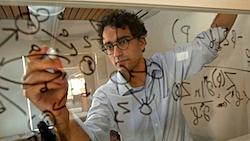- About the Tutorial:
What does a JPEG have to do with economics and quantum gravity? All of them are about what happens when you simplify world-descriptions. A JPEG compresses an image by throwing out fine structure in ways a casual glance won't detect. Economists produce theories of human behavior that gloss over the details of individual psychology. Meanwhile, even our most sophisticated physics experiments can't show us the most fundamental building-blocks of matter, and so our theories have to make do with descriptions that blur out the smallest scales. The study of how theories change as we move to more or less detailed descriptions is known as renormalization.
This tutorial provides a modern introduction to renormalization from a complex systems point of view. Simon DeDeo will take students from basic concepts in information theory and image processing to some of the most important concepts in complexity, including emergence, coarse-graining, and effective theories. Only basic comfort with the use of probabilities is required for the majority of the material; some more advanced modules rely on more sophisticated algebra and basic calculus, but can be skipped. Solution sets include Python and Mathematica code to give more advanced learners hands-on experience with both mathematics and applications to data.
We'll introduce, in an elementary fashion, explicit examples of model-building including Markov Chains and Cellular Automata. We'll cover some new ideas for the description of complex systems including the Krohn-Rhodes theorem and State-Space Compression. And we'll show the connections between classic problems in physics, including the Ising model and plasma physics, and cutting-edge questions in machine learning and artificial intelligence.
- About the Instructor(s):
 Simon DeDeo is an assistant professor in the School of Social and Decision Sciences at Carnegie Mellon University, and external faculty at the Santa Fe Institute.
Simon DeDeo is an assistant professor in the School of Social and Decision Sciences at Carnegie Mellon University, and external faculty at the Santa Fe Institute.He received his A.B. from Harvard College in 2000, the Certificate of Advanced Study in Mathematics (Part III) from Cambridge University in 2001, and a Ph.D. in Astrophysics from Princeton University in 2005. Since 2010, he has been affiliated with the Santa Fe Institute, and has done research in cognition and social behavior. With colleagues and students at the Laboratory for Social Minds, he has undertaken quantitative studies ranging from innovation and conflict on Wikipedia to the creation of signals in the British legal system, the emergence of dominance hierarchies in the social animals, and the evolution and social dynamics of Anglo-American poetry, String Theory, and Harry Potter fan fiction.
- How to use Complexity Explorer:
- How to use Complexity Explorer
- Enrolled students:
-
2,347
- Prerequisites:
-
Some Pre-calculus and Programming needed for the homework
- Like this tutorial?
- Donate to help fund more like it
- Twitter link
Syllabus
- Introduction to Renormalization
- Markov Chains
- Cellular Automata
- Ising Model
- Krohn-Rhodes Theorem
- A Classical Analogy for Renormalization in Quantum Electrodynamics
- Conclusion: The Future of Renormalization & Rate Distortion Theory
- Homework

